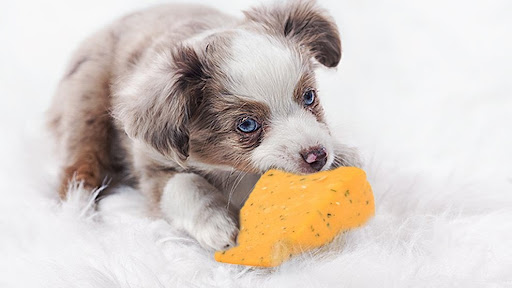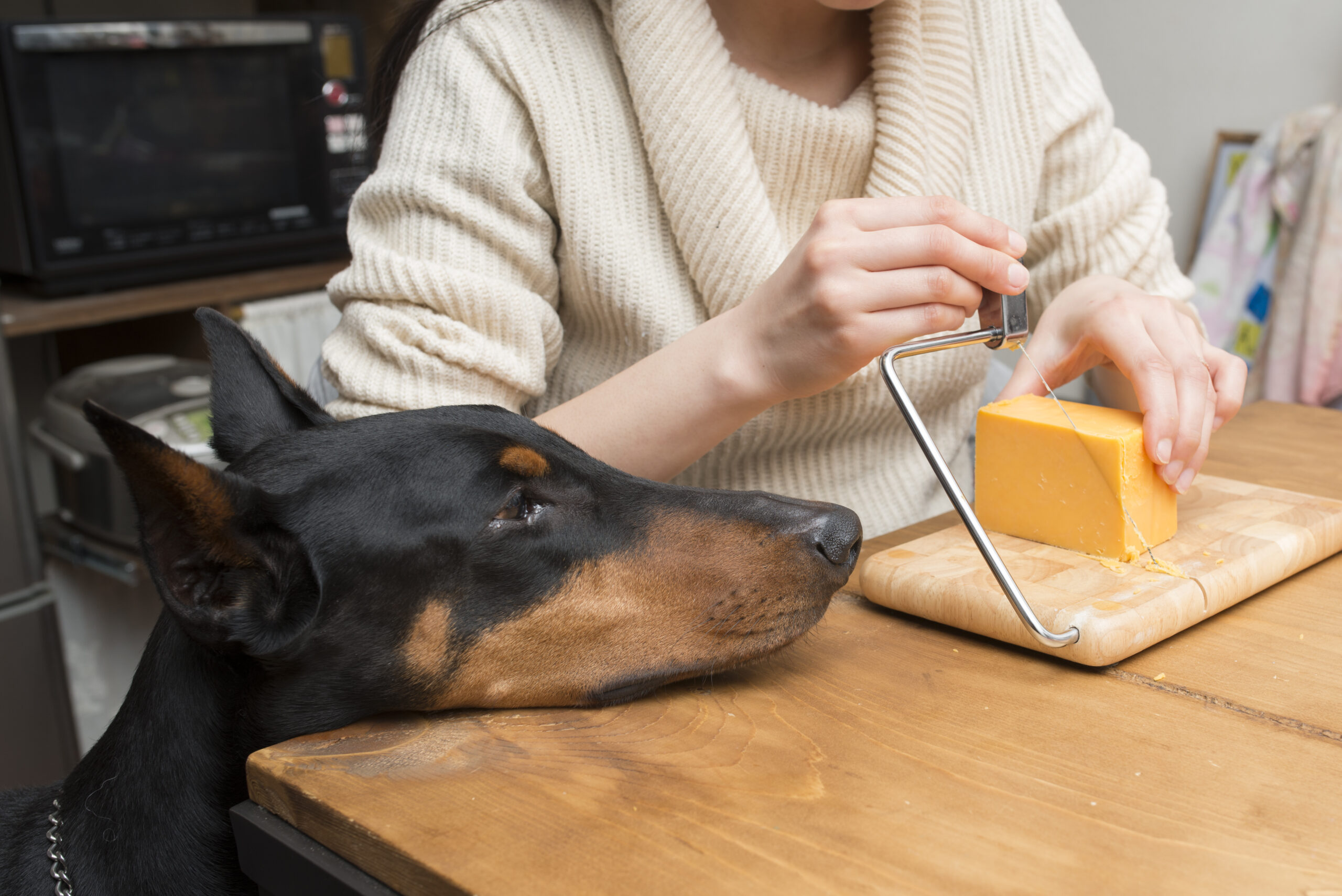If you’ve ever enjoyed a cheesy slice of pizza while your dog looks on with longing eyes, you might have wondered if dogs can safely indulge in cheese. After all, cheese is a nourishing treat for humans, so it’s only natural to question whether it can also benefit our dogs. In this blog post, we’ll share the pros and cons of sharing this snack with your pooch, so you can make an informed decision about whether cheese is a good addition to their diet. So let’s get started.

Is Cheese Bad for Dogs?
Whether cheese is bad for dogs depends on several factors, so there’s no simple yes or no answer. Here’s a breakdown:
Cheese can be safe in moderation for most dogs:
- Many dogs can tolerate small amounts of cheese without any problems. They may even enjoy it as a tasty treat.
- Cheese can be a good training tool due to its strong smell and enticing flavor.
However, there are some potential downsides to consider:
- Lactose intolerance: Some dogs lack the enzyme needed to digest lactose, the sugar found in milk and dairy products. This can lead to digestive issues like diarrhea, vomiting, and gas if they eat cheese.
- High-fat content: Cheese is high in fat, which can contribute to weight gain and pancreatitis if eaten in large quantities.
- Added ingredients: Some cheeses contain toxic ingredients for dogs, such as garlic, onions, and grapes. Always check the label before giving your dog cheese.
Potential Risks of Cheese for Dogs
Here are a few potential risks to consider before sharing cheese with your dog:

- Toxic Ingredients: Some types of cheese contain ingredients that can be toxic to dogs. For example, blue cheeses like Roquefort, Gorgonzola, and Stilton can produce a toxin called roquefortine C, which can be potentially lethal to dogs. The levels of this toxin in these cheeses range from 0.05 to 1.47 mg/kg. Consuming large amounts of these cheeses can cause symptoms such as tachycardia, lethargy, and panting.
- High-Fat Content: Certain cheeses, such as Brie, goat cheese, and feta, have high levels of saturated fat. A diet high in fat can be detrimental to dogs, especially senior dogs. It increases the risk of conditions like pancreatitis, which can be life-threatening to your canine companion.
- Garlic Contamination: Garlic is known to be toxic to dogs. Some cheeses, even if they contain a small amount of garlic, can pose a risk to your dog’s health if ingested. It’s crucial to be cautious when selecting cheese varieties to ensure they do not contain harmful ingredients.
What Kind of Cheese Shouldn’t Dogs Eat?
Here are some types of cheese that you should avoid giving to your dog:
- Cheeses with Added Ingredients: Steer clear of any cheeses that contain toxic ingredients for dogs. Common additives like onions, chives, garlic, leeks, shallots, grapes (including raisins), and tarragon can be harmful to dogs. These ingredients can lead to serious health issues, such as toxicity and anemia.
- Spicy Cheeses: While dogs may not have a strong sense of taste, they can still experience discomfort from spicy foods. Spicy cheeses like pepper jack and spicy cheddar can irritate their mouth and cause gastrointestinal upset, including gas, diarrhea, and vomiting. It’s best to avoid these types of cheeses for your dog’s well-being.
- Cheeses with Herbs: Certain cheeses may contain herbs that are toxic to dogs. Herbs like onions, chives, and garlic can be harmful to your dog if ingested in large amounts. It’s essential to check the ingredients list and avoid cheeses that contain these potentially dangerous herbs.
How Much Cheese is OK for Dogs to Eat?
Determining how much cheese is okay for your dog depends on several factors:

1. Your dog’s size and activity level:
- Large, active dogs can generally tolerate slightly more cheese than small or inactive dogs.
- A golden retriever may handle a cube of mozzarella, while a chihuahua might be better off with a tiny shred.
2. Your dog’s tolerance for lactose:
- Dogs with lactose intolerance should avoid cheese or stick to very small amounts of low-lactose cheeses. Look for cheeses like Cheddar or Parmesan.
- If you’re unsure about your dog’s tolerance, start with a tiny amount and monitor for any digestive upset.
3. The type of cheese:
- High-fat cheeses, like brie or cream cheese, should be avoided due to potential weight gain and pancreatitis risks.
- Low-fat cheeses, like mozzarella or cottage cheese, are better options.
Frequently Asked Questions
What happens when a dog eats cheese?
Eating cheese could trigger pancreatitis, especially for breeds prone to pancreatitis like schnauzers and cocker spaniels. Pancreatitis often results in stomach upset, diarrhea, and a painful belly, and severe cases can result in death.
Are eggs or cheese bad for dogs?
Boiled eggs and scrambled eggs (without salt, butter, or milk) are safe for dogs. However, too much salt can dehydrate dogs, and dairy products can cause stomach upset because dogs have difficulty digesting them.

Hey there, I’m Janet Brooks, a dog-loving student from California. I’m all about helping pups in need, especially those without homes. Me and my awesome friends work together to give shelter and love to stray dogs. Oh, and I also write blogs about dogs to share helpful info.